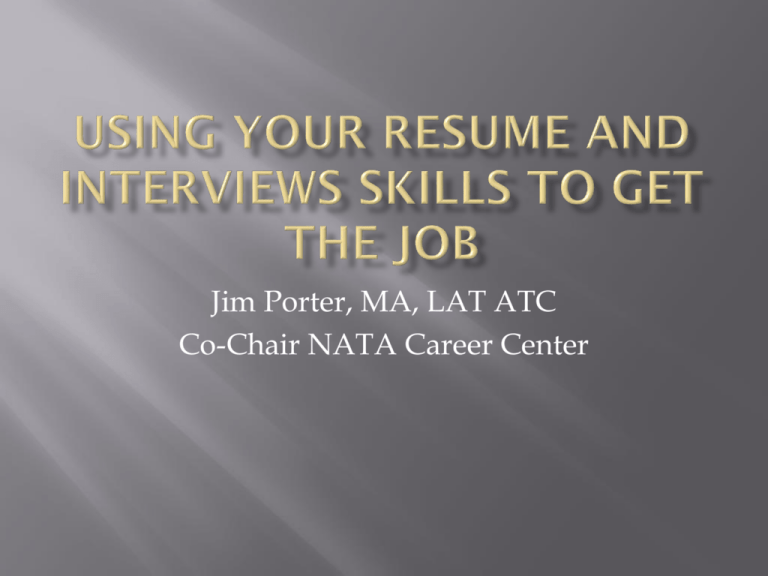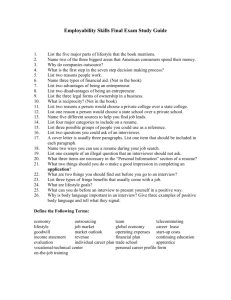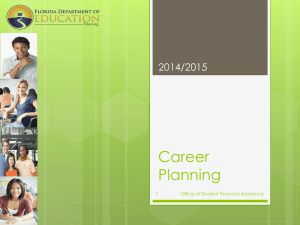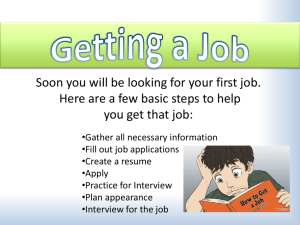taking your resume and interviews skills to get the job
advertisement

Jim Porter, MA, LAT ATC Co-Chair NATA Career Center Curriculum Vitae: Teaching/Lecture/Advanced Degree “Course of One’s Life Achievements” HealthCare Resume: Gets you the job that pays for the education/Advanced Degree “Makes an employer want to talk to you” Paper vs electronic vs multimedia “Resume is a dumb piece of Paper or media, You make it Interesting” Paper: Use for job fair or Career Center One page only and must catch employer’s eye in half page Mailing is 20th Century Media Electronic Options for Specific Job listing Power Point (limit to 13 slides) PDF format Word Format Video Interview You and your contact information Your Current Credentials-Not what they will be Your specific UNIQUE skills, experience and commitment to quality teamwork Who you are and how you got to this point What you bring to the employer, NOT what the employer brings to you. No employer hires because you need a job. Each job needs a specific resume to get the Interview Key Skills and Knowledge: Remember the employer knows what an Athletic Trainer should know Avoid listing competencies and list only your sports specific experience What Skills and Experience sets you apart. Education: CAATE sets your education the reason for listing is to connect with graduates of your program or employers that are aware of your school Adding References may connect you with alumni, employers that have had great employees from your school or part of the network from where your were. Employers do not want to take extra time to follow-up with you for a list of references or bother having to call. Always include email address for references Gary White, MA, ATC, LAT Athletic Trainer Areas of Expertise Concussion Evaluation Kinesotaping Manual Therapy Laser Therapy Return to Play Decisions PERSONAL SUMMARY A highly motivated, confident professional with exceptional multi-tasking and organizational skills. Able to communicate effectively in English and Spanish with sensitivity to the needs and goals of the patients to quickly return them to play after injury and ensure understanding of the complex clinical issues impacting full recovery and prevention of loss of playing time. A Team player with the ability to work closely with coaches, parents, physicians and other allied health professionals to assess, patient needs, establish a care plan and get them back on the playing field. Ready and qualified for the next stage in my career and looking forward to making a significant contribution as a member of an Athletic Care Team. EXPERIENCE Athletic Training Experience Professional AHA Instructor NV State Athletic Training License June 2008 to Present Provide on-site Athletic Training Services at Sierra Madre High School. Head Athletic Trainer for 17 interscholastic sports with-in the NIAA. Duties: Provide ImPACT testing post-injury assessment as part of the District Care protocol Integrated the C3 Logix concussion management tool into High School Performed a Program evaluation of care of ankle injuries to determine “best care plan” for return to play Provided Preceptor Training working with UNLV AT Curriculum Program Implemented Football Helmet weekly checks Personal Skills Bait Line Strong Work ethic KEY SKILLS AND COMPETENCIES Professional, ethical practice Listening skills Multi-tasking Speaks fluent Spanish Ability to manage escalations, incidents, issues and risk. Experience of dealing with emotional and stressful situations Can motivate others through effective communication skills Able to deal with hostility in the form of verbal and physical aggression Ability to work independently in busy environment Highly developed dexterity, co-ordination and palpation skills Strong work ethic and dedication to getting the job done. EDUCATION Western Michigan University 2006-2008 Master’s Degree in Athletic Training Central Michigan University 2002-2006 Bachelor of Science Degree in Physical Education/Biology Personal Details Gary White 65100 Hinson Street Las Vegas, NV 89118-5512 gwhiteatc@ggmail.com 702-555-5555 References on page 2 “How to Get your Point Across in 30 Seconds or Less” by Milo Frank Remember in 2015, your peers communicate in 140 characters or less, SO does the employers Takes too long to paint a picture of YOU ONE PAGE ONLY, not more as managers do not want to read Lack of attention to detail (grammer, spelling, font, typing) Failure to understand what the employer needs Gaps and red flags that raise questions Experience that is too weak, too strong for the position Too much experience unrelated to the specific job needs Failure to connect with employer-FIND COMMON GROUND and know the job you are applying for Failure to prepare the Resume as if your career Depends on it. Failure to have your Resume reviewed by known supervisors Failure to understand the hiring process Failure to address the specific skills, tasks and experience the employer is looking for Failure to make resume specific to job Failure to use Power or action words in resume (Passive Voice) Failure to know what at good Resume looks like. Check out Smart Resume Wizard, www.dummies.com/howtowritea resume It Does! Your Interview Skills and Preparation for the Interview get the JOB Go to www.iseek.com Preparing for interview Clean up your social media. Facebook/twitter/Instagram/use social sweeper to clean out “wild and crazy life” Video interview sessions and review what you see Practice answering questions a lot Seek connection with hiring personnel Research the company or entity and know what and why they exist. Website, internet search and employees or former can help Video (most smart phones) your non-verbal presentation. Do you know what you communicate without talking? Practice tough questions and consider any possible issues they could ask about regardless if they are legally allowed to ask Know more about the job then the interviewer You need to demonstrate confidence, fearless eye contact, physical connection with hand shake, ability to communicate under stress Professional Dress Code (Know company dress code) Well Groomed Learn to Listen (allow a 15 second pause after interviewer stops talking to respond) Don’t talk to much. Let Interviewer led discussion Avoid yes and no answers. You are selling you to the Interviewer. Remember you are not looking for a friend or date. PROFESSIONAL Careful with your language, avoid street or slang language, Don’t be cocky! This is not your opportunity to brag or show up the interviewer Don’t appear to be desperate or bring your mother or significant other to interview Let their questions led into questions you wish to act Demonstrate your ability to adapt and willingness to learn new skills Be COOL, CALM and CONFIDENT. YOU need to let interviewer know you can deliver. This demonstrates how you get the job done prudently and professionally Schedule a 10:30 am interview (research tells us this in when most interviewees are hired) Arrive at least 15 minutes before interview Turn off phone, leave headphones in car Make a positive, professional first impression SMILE! Good Posture with plenty of Energy Know the job hiring process before the interview Make eye contact, followed by firm strong handshake Know how you are going to answer their questions including: How you fit into their team Why you are the best fit for their needs Bring Portfolio of best work (ie: project or injury report) Be Confident but listen! Be Yourself but control your voice and pitch Use Power or Action words Do not be afraid to ask for clarification Be Courteous and allow interview to end on time. If Interviewer wants additional time allow them to control how long Ask the Interviewer how to follow up and when the decision will be made Make sure the Interviewer has the best contact information for you and your references Avoiding topics that get you in trouble and are unrelated to being an employee. Martial status, religion, age, politics, your favorite team Yes and no answers Lack of interest in the company or entity Overstating your knowledge, skills or experience Speak negatively about peers Failure to practice and know what your non-verbal communication appears Failure to remain calm and confident in interview can reflect on how you react in a AT Crisis such as Cardiac Arrest or Catastrophic Incident Failure to communicate your “aha” moments Application form or resume is incomplete, sloppy or looks like everyone else Overly aggressive and Cocky Lack of Maturity Inability to communicate Lack of interest or enthusiasm in job or company Inability to make a first impression with resume or at onset of interview Being vague to questions or not prepared to answer questions Failure to know WHO YOU ARE? Poor non-verbal skills Lack of Preparation Overemphasis on money Negative attitude about past employers or peers (you never know their network) Failure to appreciate the Interviewer’s Time






